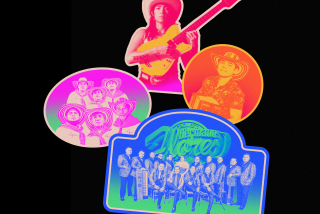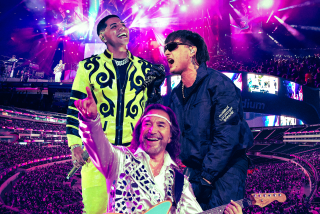Los Tigres del Norte’s Hollywood is the first norteño act to play the Hollywood Bowl. Why it matters
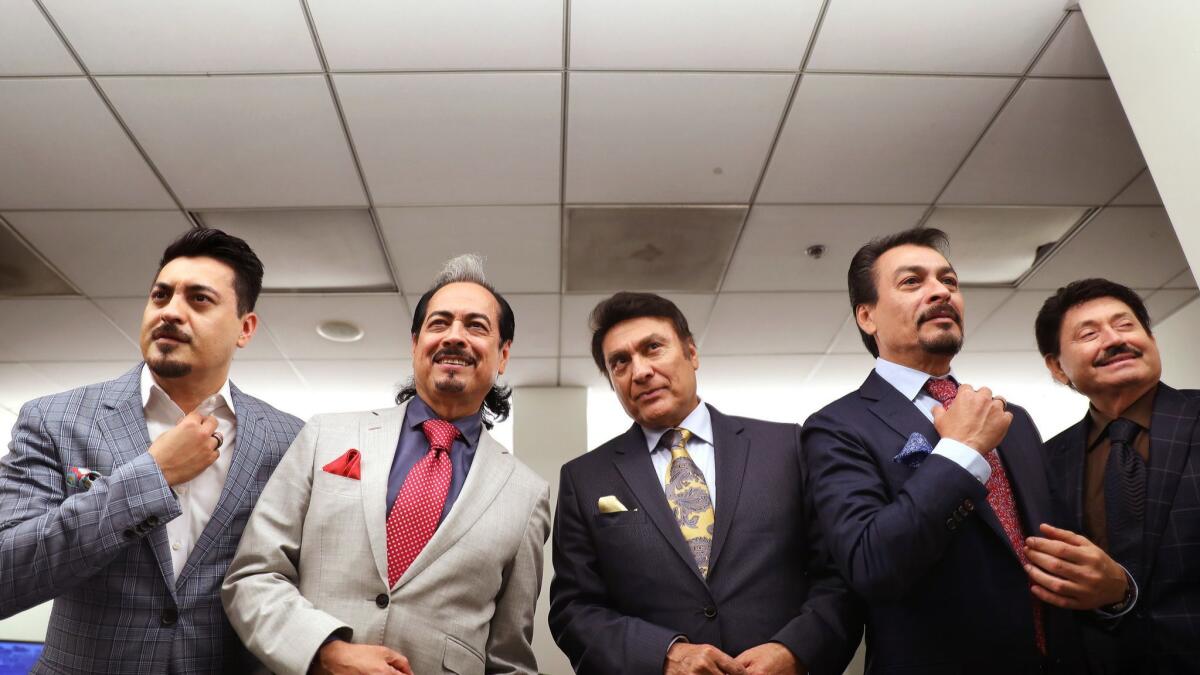
You can tell the story of Los Tigres del Norte with numbers.
Over a career that spans five decades, the norteño act has sold 37 million albums and recorded 500 songs. They have seven Grammy Awards, eight Latin Grammys and they’ve had 66 songs land on Billboard’s “Hot Latin Songs” chart, the most of any Latin music act ever.
In 2002, more than 67,000 people turned out to watch them play at the Houston Astrodome —12,000 more than showed up to watch the Beatles at Shea Stadium in 1965.
But you can also tell the story of Los Tigres through places.
There is Rosa Morada, the small ranching town in the northwestern Mexican state of Sinaloa where they grew up. Mexicali, the border city where they cut their teeth supplying soundtracks to local bordellos. Soledad, Calif., where they played their first concert in the United States — for the Mexican inmates at the state prison there.
Since then, Los Tigres have played just about every top venue in Mexico and the U.S., including the Los Angeles’ Staples Center and Walt Disney Concert Hall, Mexico City’s 87,000-seat Azteca stadium and the country’s Auditorio Nacional (National Auditorium) — the equivalent of the Kennedy Center in Washington, D.C, a venue they have also played.
At this stage in their careers, it’s difficult to imagine another boundary that these elder statesmen of norteño might break. But on Saturday, just one day ahead of Mexican independence, Los Tigres del Norte will become the first norteño act to headline at the Hollywood Bowl.
“Who could imagine when we came here for the first time, that we would have an opportunity to play in all of these places,” says lead singer Jorge Hernandez, as he settles into a chair in a Hollywood Bowl green room. Those places include concerts in 48 of the 50 U.S. States (except North Dakota and Montana).
“It’s a dream for us,” Hernandez adds, surrounded by his band mates, all wearing dapper suits: his brothers Hernán, Eduardo and Luis, and cousin Oscar Lara. “It continues to be one every time something like this happens.”
But the concert at the Bowl, in some ways, brings the story of Los Tigres full circle.
“Hollywood has a very important significance for us,” says Hernán, the group’s bass player, who is known for flamboyant coiffures dabbed with a prominent streak of white. “The first song that the public knew was about Camelia, who was going to Hollywood.”
He refers to the band’s first hit, “Contrabando y Traición” (“Smuggling and Betrayal”), from 1972, which told the story of Emilio Varela and Camelia la Texana, a pair of smugglers moving a load of marijuana from San Ysidro to Hollywood. After their delivery is made, Varela announces that he is abandoning Camelia for another woman. She shoots him and disappears with the drug money.
With its cinematic lyrics, its impulsive female lead and its sampled sounds (gunshots ring out when Camelia dispatches her man in the final verses), the song was a runaway hit. It established Los Tigres’ reputation as a band worth listening to. And it helped inspire the entire genre of narcocorridos (ballads about drug trade). Quite inevitably, in 2014, the song also inspired a telenovela on Telemundo called “Camelia la Texana.”
“Hollywood is important to Los Tigres del Norte,” adds Hernán. “Our first song was about Hollywood. We have a star on the Hollywood Walk of Fame” — awarded in 2014. “And now, for the first time, we will play a concert here.”
“Being here,” chimes in Jorge, “it’s the same type of test as being at the Auditorio Nacional in Mexico.”
It is another little badge of prestige to add to the many that they have already accumulated.
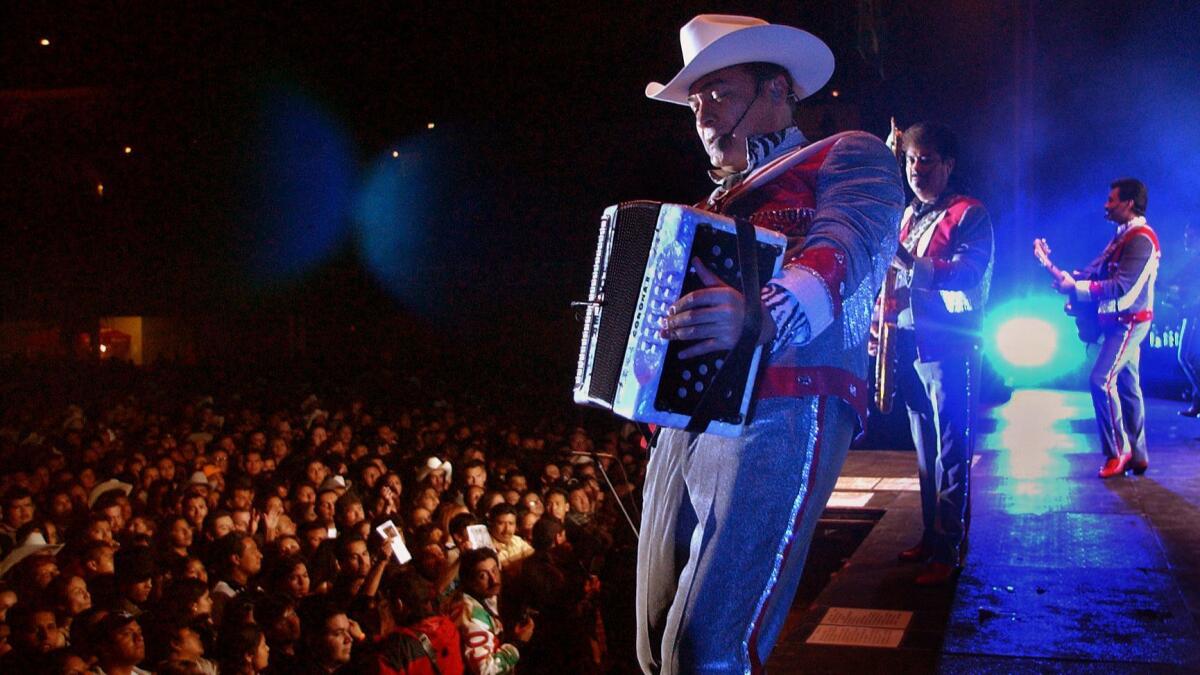
It is hard to overstate the importance of Los Tigres del Norte to Latin music and to norteño — not to mention to Latino immigrants in general. The band members, which since that first gig at Soledad Prison have been based in the Bay Area (San Jose, to be exact), are U.S. citizens. And their work has frequently touched on the everyday lives of recent immigrants: the hard work, the yearning for home and the politics of being the outsider when the insiders don’t want you around.
Los Tigres’ repertoire includes songs about the border wall, about laborers who cross the border without papers, about Central American migrants who have to cross not only one national border to arrive in the U.S., but several.
To stories of struggle, they have added the signature norteño bounce — fast-paced polkas and waltzes punctuated by fluttering accordions and the bajo sexto (a type of 12-string guitar). A sure cure for a bad day is to blast their ’97 album “Jefe de jefes” (“Boss of bosses”) at top volume, Jorge’s piercing vocals simultaneously channeling joy, rage and pain.
The narratives they weave with their lyrics, their meticulous work ethic and the devotion they have shown to their fans has kept them at the top of the game, even as other Mexican regional acts have seen their own stars rise.
“We have songs that have included children, young people, the new generations, we’ve done songs for the gay community,” says Jorge. “We try to cover everything so that no member of the public feels excluded. That is the mission that we have together.”
That is evidenced by the crowd at any Tigres concert — a multigenerational affair that includes grannies and toddlers and everyone in between. At a concert of theirs I happened to attend in New York City roughly a decade ago, I saw an elderly woman slingshot a support bra on stage. Its generous cups dangled from Hernán’s bass for the rest of the night.
Given their stature, and the popularity of Mexican regional music, it’s surprising that it’s taken this long for Los Tigres to be invited to perform at the Bowl.
“It’s kind of shocking in a way,” says Chon Noriega, director of the Chicano Studies Research Center at UCLA, where the band has supported an important digitization effort of 20th-century Mexican music. “They are the Spanish-language chroniclers of our time. They are speaking the dominant language of the hemisphere and they are doing it with an understanding of all the people that make up that hemisphere.”

Sign up for our weekly Essential Arts & Culture newsletter »
And they show no signs of slowing down.
The band is just beginning work on its next studio album — the first since “Realidades” was released four years ago. Jorge says they haven’t yet decided on the direction this new album might take. But the current political climate toward Mexican and Central American immigrants is likely to frame what they do.
“It’s like they’re laying out traps for us,” says Jorge of the current crackdowns on immigration. “So all of us Mexicans, and Los Tigres del Norte, we have to be careful — we have be careful what we will sing, what we will say.”
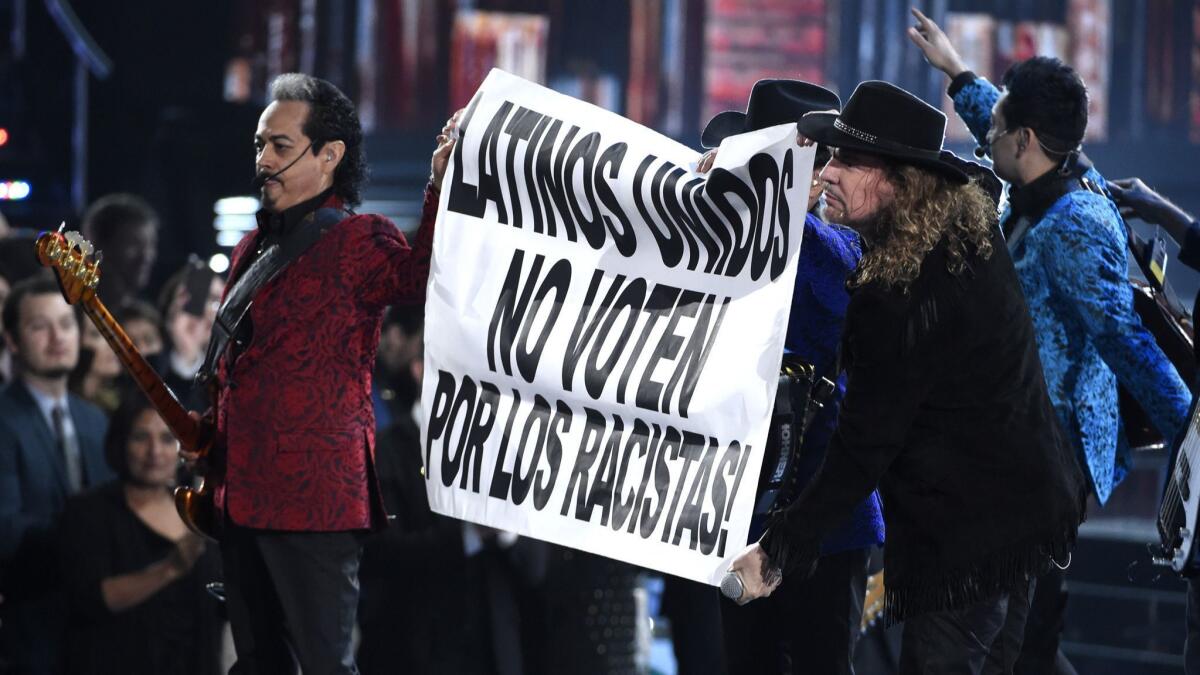
But by all means they will continue to champion Latinos. (The band famously unfurled a sign at the 2015 Latin Grammy Awards that read “Latinos United. Don’t Vote for Racists.”) And recently, they have taken an interest in the rising population of Latinos in U.S. prisons. In April, the band played a concert at Folsom Prison — marking the 50th anniversary of Johnny Cash’s famous concert there.
“When they took us to the prison, and we were walking through where the prisoners live, what I felt …,” says Eduardo, struggling to find the right words, “… it was something that reached inside my heart.”
Eduardo says they were nervous about the show — which included a Spanish-language rendition of Cash’s “Folsom Prison Blues” — but about three songs in, he says everyone seemed to relax and it became just another Los Tigres show.
“They would ask for songs,” he recalls. “They would pass us little notes with their requests, which wasn’t permitted, but they did it anyway.”
The prisoners demanded an encore (“Jefe de jefes,” of course) and one prisoner even joined them onstage: Manuel Mena, a former musician convicted of first-degree murder, who taught himself to play accordion inside Folsom and joined the band for a rendition of “Un Día a la Vez” (“One Day at a Time”).
“It was his favorite song,” says Hernán. The show, he says, was an achievement, “but one that was moving and sad.”
And it was the band’s way of saying, adds Jorge, “that this community that has been forgotten is important to us — and we wanted to give them happiness.”
Currently, the band is working on a television deal to broadcast the concert. They expect to make an announcement in the fall.
In the meantime, all eyes are on the Hollywood Bowl.
I mention to Jorge that the Bowl has a reputation for being a difficult venue among musicians.
“We’ll see,” he says with a smile. “We’ll experiment with that on the 15th.”
------------
Los Tigres del Norte
Where: Hollywood Bowl, 2301 N. Highland Ave., Los Angeles
When: 7 p.m. Saturday, Sept. 15
Tickets: $20-$150
Info: hollywoodbowl.com
ALSO
Los Tigres del Norte get a star on Hollywood Walk of Fame -- finally!
Los Tigres del Norte help unveil UCLA Mexican music archive
Latin Grammy moment: Maná and Los Tigres del Norte on raising ‘Don’t vote for racists’ sign
[email protected] | Twitter: @cmonstah
More to Read
The biggest entertainment stories
Get our big stories about Hollywood, film, television, music, arts, culture and more right in your inbox as soon as they publish.
You may occasionally receive promotional content from the Los Angeles Times.

